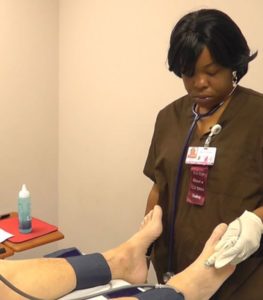
ANKLE-BRACHIAL INDEX
Ankle-Brachial Index
Ankle-Brachial Index (ABI) testing is a simple yet important test used to help diagnose peripheral arterial disease (PAD). PAD, which can often go unnoticed or ignored, is a common and potentially serious condition in which arteries in the legs become narrowed or blocked. This can cause severe blockages resulting in leg pain and numbness, as well as an increased risk of stroke and heart attack. Detecting PAD early by utilizing ABI testing can minimize further damage that could be done if left untreated for too long.
Using sound wave technology called Doppler ultrasound, a clinician measures the blood pressure of the ankle and arm similar to taking an ordinary blood pressure reading. The ABI numbers measure the ratio between these two readings—the higher the number equals greater healthy artery activity. Low numbers may signify poor circulation due to diseased arteries throughout your body’s extremities.
In short, ABI testing is an easy test that assesses whether there is enough oxygen-rich blood flow moving throughout your limbs and lower body in order to detect potential health risks before they worsen. All you need for this procedure is a medical professional trained in taking ultrasound measurements using special tools called transducers which are placed against your skin over specific areas of interest such as arm arteries or leg veins/arteries.
Preventive Treatment May Be Recommended
Your doctor may recommend preventative treatment after having completed ABI testing if your results indicate existing risk factors for heart attack or stroke; however it must be noted that elevated levels could not necessarily mean any danger, but certainly warrants further investigation with additional tests like CTA scans (computed tomography angiography) or MRA scans (magnetic resonance angiography). In any case, it’s important to remain mindful of potential warning signs so that you can become aware early on if something unusual should happen later down the road with your cardiovascular system–such as unusual pains in the legs when walking–and discuss any concerns immediately with your doctor!
